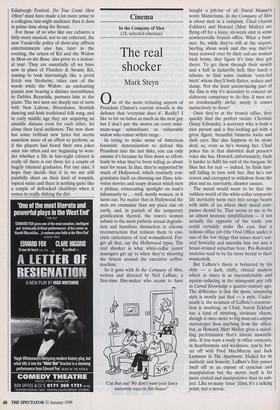Cinema
The real shocker
Mark Steyn
One of the more irritating aspects of President Clinton's current travails is the defence that 'everyone does it'. Really? I like to hit on babes as much as the next guy but I don't put the moves on every mini- mum-wage subordinate or vulnerable widow who comes within range.
In trying to make sense of American feminists' determination to defend this President into the last dyke, you can only assume it's because he lives down so effort- lessly to what they've been telling us about men for years. In that, they're supported by much of Hollywood, which routinely con- gratulates itself on churning out films, tele- vision movies and soapy dramas which turn a pitiless, eviscerating spotlight on man's inhumanity to ... well, mostly women, as it turns out. No matter that in Hollywood the men are crummier than any place else on earth, and, in pursuit of the temporary gratification thereof, the town's women submit to the most pathetic sexual degrada- tion and humiliate themselves in silicone reconstruction that reduces them to con- crete caricatures of real womanhood. For- get all that, say the Hollywood types. The real shocker is what white-collar junior managers get up to when they're shooting the breeze around the executive coffee- machine.
So it goes with In the Company of Men, written and directed by Neil LaBute, a first-time film-maker who seems to have 'Cut that out! We don't want your fancy university ways in this house!' bought a job-lot of all David Mamet's worst Mametisrns. In the Company of Men is about men in a company. Chad (Aaron Eckhart) and Howard (Matt Malloy) are flying off for a lousy, six-week stint in some nowheresville branch office. What a bum- mer. So, while they're still at the airport, beefing about work and the way they've been screwed over by their sad-ass women back home, they figure it's time they got theirs. To get them through their month and a half in hicksville hell, they hatch a scheme to find some random 'corn-fed bitch' whom they'll both flatter, seduce and dump. Not the least unconvincing part of the film is why it's necessary to concoct an elaborate conspiracy to do this: if men are so irredeemably awful, surely it comes instinctively to them?
Orice they're at the branch office, they quickly find the perfect victim: Christine (Stacy Edwards), a secretary who is both a nice person and a fine-looking gal with a great figure, beautiful brunette locks and dark eyes. She also happens to be stone deaf, so, even as he's wooing her, Chad pokes fun at that distorted deaf person's voice she has. Howard, unfortunately, finds it harder to fulfil his end of the bargain: he likes her for real — indeed, he finds him- self falling in love with her. But he's too craven and corrupted to withdraw from the plan and so, inevitably, disaster ensues.
The moral would seem to be that the ruthless world of the white-collar corporate life inevitably turns men into savage beasts with slabs of ice where their moral com- passes should be. That seems to me to be an almost moronic simplification — if not actually the opposite of the truth: you could certainly make the case that a tedious office job (the Oval Office aside) is one of the few things that tames man's nat- ural bestiality and smooths him out into a house-trained suburban bore. Pre-Rolodex societies tend to be far more brutal to their womenfolk.
But LaBute's thesis is bolstered by his style — a dark, chilly, clinical analysis which at times is as uncomfortable and squirm-inducing as the misogynist guy talk in Carnal Knowledge a quarter-century ago. The difference is that the spare, unsparing style is mostly just that — a style. Under- neath it, the neatness of LaBute's construc- tion is insulting: as Chad, Aaron Eckhart has a kind of strutting, cocksure' charm, though it owes more to big-man-on-campus stereotypes than anything from the office; but, as Howard, Matt Malloy gives a snivel- ling performance that's almost unwatch- able. If you want a study in office contrasts, in heartlessness and weakness, you're bet- ter off with Fred MacMurray and Jack Lemmon in The Apartment. Hailed for its audacity and honesty, LaBute's film passes itself off as an exposé of cynicism and manipulation but the movie itself is far more cynical and manipulative than its sub- ject. Like so many 'issue' films, it's a talking point, not a movie.


































































 Previous page
Previous page